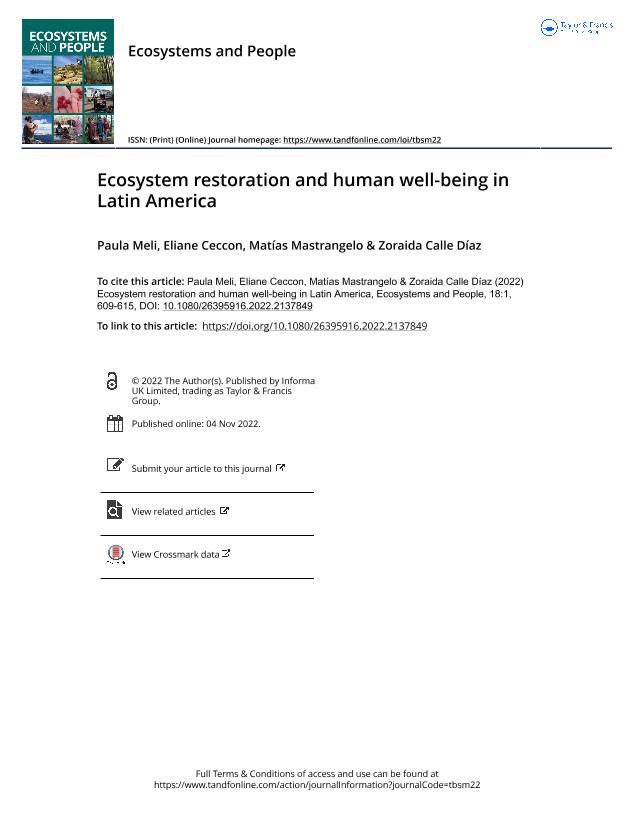Artículo
Ecosystem restoration and human well-being in Latin America
Fecha de publicación:
11/2022
Editorial:
Taylor & Francis
Revista:
Ecosystems and People
ISSN:
2639-5908
e-ISSN:
2639-5916
Idioma:
Inglés
Tipo de recurso:
Artículo publicado
Clasificación temática:
Resumen
Ecosystem restoration has become increasingly prominent in global, national and regional treaties, coalitions and conventions. Significantly, 2021 marked the beginning of the United Nations Decade on Ecosystem Restoration (UNEP and FAO 2020). This strategy aims to engage actors from all spheres of society to overcome political, socioeconomic and technical barriers to implementing ecosystem restoration at multiple scales. However, it demands transdisciplinary approaches to address its inherently complex and multi-dimensional implementation (Cengiz et al. 2019; Mansourian and Parrotta 2019).Some challenges to implementing ecosystem restoration in Latin America emerge due to its particular political and social-ecological context. Major environmental challenges in Latin America occur in rural landscapes and are not related to livelihood improvements but survival; the dichotomy is survival versus conservation (Gligo 2001). The average percentage of Latin American people living in multi-dimensional poverty in rural areas is high (52.6%). There is a huge difference among countries. For instance, Honduras and Guatemala hold 82% and 77% of rural poor, while Uruguay and Chile only 2% and 7%, respectively (FAO 2018). This social problem is associated with ecological degradation since Latin America is one of the three regions where deforestation has advanced the most (FAO 2018). Due to the joint impacts of poverty and deforestation, the communities’ cultural identity and forms of social reproduction are weakened, given the fragmentation of their societies and landscapes.Besides, as the total population in Latin American countries continues to increase, extensively natural ecosystems are still converted to pastures for low-density livestock and crops. The future of these ecosystems will depend on how the region responds to this conversion. In this sense, ecosystem restoration is gaining momentum on the political agenda. Thirteen of 28 Latin American countries signed an agreement in 2014 to restore 20 million hectares by 2020 and achieve carbon neutrality by 2050 (https://initiative20x20.org). These political aspirations have the potential to create jobs, increase environmental values and capture from 4.5 to 8.8 billion tons of annual CO2 emissions by 2030 (Suding et al. 2015). However, only five signatory countries currently count on a policy instrument (for example, a restoration plan) to achieve the objectives proposed (Méndez-Toribio et al. 2017; Assad et al. 2020).This scenario has prompted Latin American scientists to rethink their paradigms as they face decades of economic crisis, poverty, social and agrarian injustice, migration, biodiversity loss, climate threats, civil wars, narcotraffic violence, and many other consequences of sustainable development goals. Thus, a perspective focusing on the interaction between social and ecological systems is emerging strongly in Latin America to understand better the complexity of this crisis, exacerbated by global climatic and ecological changes (Castro-Díaz et al. 2019).Managing the current human-modified landscapes in Latin America to restore ecosystems while maintaining ecosystem services to produce human well-being is crucial to promoting win-win schemes for the environment and societies (Meyfroidt et al. 2010). This Special Issue presents five papers featuring cases and viewpoints of those working on ecosystem restoration to produce human well-being and associated issues such as governance and social participation in the region.
Archivos asociados
Licencia
Identificadores
Colecciones
Articulos(CCT - MAR DEL PLATA)
Articulos de CTRO.CIENTIFICO TECNOL.CONICET - MAR DEL PLATA
Articulos de CTRO.CIENTIFICO TECNOL.CONICET - MAR DEL PLATA
Citación
Meli, Paula; Ceccon, Eliane; Mastrangelo, Matias Enrique; Calle Díaz, Zoraida; Ecosystem restoration and human well-being in Latin America; Taylor & Francis; Ecosystems and People; 18; 1; 11-2022; 609-615
Compartir
Altmétricas




